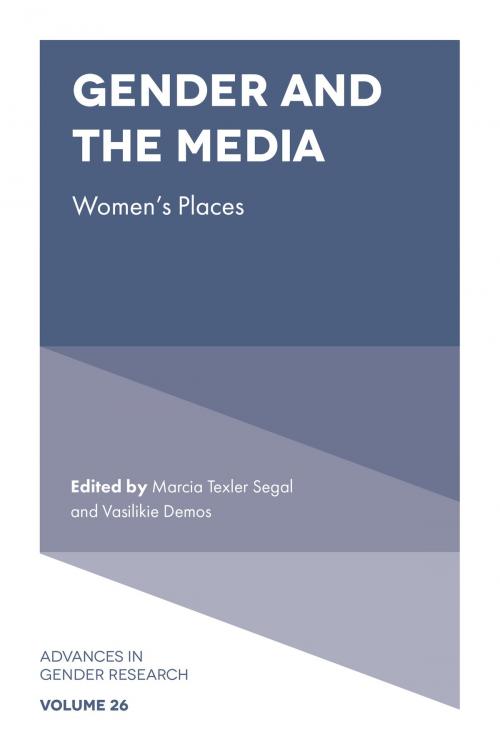Gender and the Media
Women's Places
Nonfiction, Social & Cultural Studies, Social Science, Gender Studies, Women&| Author: | ISBN: | 9781787543317 | |
| Publisher: | Emerald Publishing Limited | Publication: | November 19, 2018 |
| Imprint: | Emerald Publishing Limited | Language: | English |
| Author: | |
| ISBN: | 9781787543317 |
| Publisher: | Emerald Publishing Limited |
| Publication: | November 19, 2018 |
| Imprint: | Emerald Publishing Limited |
| Language: | English |
Media images shape and are shaped by society. They reflect the ways in which the social order changes and stays the same. The contributors to Gender and the Media: Women’s Places consider a variety of media to explore the impact of what is there, as well as what is missing. Their focus is on women. Networks of the cyberbullying of women of color are rendered graphically and the agency claimed by women in Western Sahara refugee camps is shown in photos. How college women and men respond to the masculinity reflected in hip-hop lyrics and videos, and what it feels like to be a woman in a comic book store are conveyed in excerpts from interviews. Contributors detail how publications discuss rape in India and trafficking in Moldova and ponder the absence of the topic of anorexia in U.S. cinema. Social change is reflected in how trade publications discuss the increasing number of women in the funeral industry. The relation of the local to the global and female invisibility is considered in an analysis of Portuguese punk fanzines. An examination of advice books for American tween girls documents not only the subject matter, but also the racial, ethnic and religious homogeneity and heteronormativity assumed in the text and illustrations. Finally, a comparison of the critical response to identical music recorded by female and male artists provides the opportunity to see the role gender plays in criticism of aesthetic materials.
Media images shape and are shaped by society. They reflect the ways in which the social order changes and stays the same. The contributors to Gender and the Media: Women’s Places consider a variety of media to explore the impact of what is there, as well as what is missing. Their focus is on women. Networks of the cyberbullying of women of color are rendered graphically and the agency claimed by women in Western Sahara refugee camps is shown in photos. How college women and men respond to the masculinity reflected in hip-hop lyrics and videos, and what it feels like to be a woman in a comic book store are conveyed in excerpts from interviews. Contributors detail how publications discuss rape in India and trafficking in Moldova and ponder the absence of the topic of anorexia in U.S. cinema. Social change is reflected in how trade publications discuss the increasing number of women in the funeral industry. The relation of the local to the global and female invisibility is considered in an analysis of Portuguese punk fanzines. An examination of advice books for American tween girls documents not only the subject matter, but also the racial, ethnic and religious homogeneity and heteronormativity assumed in the text and illustrations. Finally, a comparison of the critical response to identical music recorded by female and male artists provides the opportunity to see the role gender plays in criticism of aesthetic materials.















